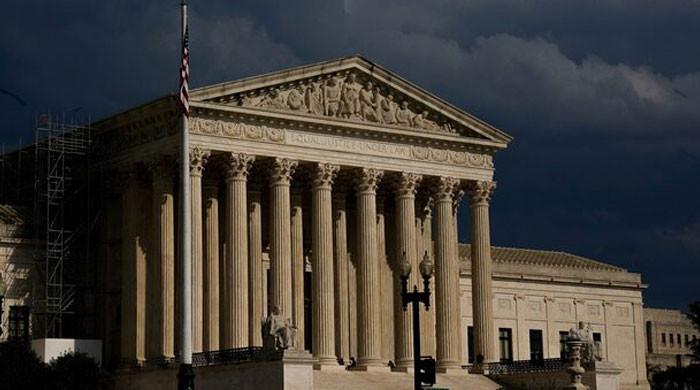Washington: A Supreme Court of the United States divided gave President Donald Trump a great victory on Friday by stopping the power of lonely federal judges to block executive actions.
In a 6-3 ruling derived from Trump’s commitment to end the birth citizenship of birth, the court said that the national mandates issued by the judges of the district courts “probably exceed the equitable authority that Congress has granted to federal courts.”
The Superior Court did not rule on the constitutionality of Trump’s executive order that seeks to end automatic citizenship for children born on American soil.
But the broader decision on the scope of judicial decisions eliminates a great obstacle to the political agenda often very controversial of Trump and has high -range ramifications for the ability of the Judiciary to control Trump or future US presidents.
Trump celebrated telling journalists that he had “a complete list” of policies that he could now continue without opposition in the courts.
Trump’s executive order on the citizenship of birth law is only one of his movements that have been blocked by judges throughout the country, both democratic and republican, since he assumed the position in January.
The courts, for example, have blocked or slowed their repression of hard line immigration, dismissal of federal employees, efforts to end the diversity programs and punitive actions against law firms and universities.
The previous presidents have also complained about the national mandates that chain their agenda, but such orders have increased sharply under Trump, who saw more in his first two months than the Democrat Joe Biden during his first three years in office.
Judge Amy Coney Barrett, a Trump designated who was the author of the majority opinion linked by the other five conservative judges, said that “the universal mandate was remarkably non -existent for most of the history of our nation.”
“Federal courts do not exercise general supervision of the executive branch,” Barrett wrote.
“When a court concludes that the executive branch has acted illegally, the answer is not that the court also exceeds its power,” he said.
The three liberal judges dismit to Judge Sonia Sotomayor saying that “no right is sure in the new legal regime created by the court.”
“The decision of the court is nothing less than an open invitation for the government to ignore the Constitution,” said Sotomayor.
“The executive branch can now enforce the policies that floated in the established law and violate the constitutional rights of innumerable people, and the federal courts will be hindered to stop their actions completely,” he said.
‘Giant Win’
Trump, in a publication about Truth Social, welcomed the ruling as a “giant victory.”
The case was apparently the executive order of Trump that ended the citizenship of birth law, which was considered unconstitutional by the courts of Maryland, Massachusetts and the state of Washington.
But in reality he focused on whether a single judge of the Federal District Court has the right to issue a national block to a presidential decree with a universal court order.
The problem has become a shout of meeting for Trump and its Republican allies, who accuse the Judiciary of preventing their agenda against the will of voters.
Steven Schwinn, a law professor at the University of Illinois Chicago, said the court ruling “abruptly undermines the power of federal courts to reinterpret the actions without government law.”
“The ruling will probably create a mosaic of citizenship rights of birth law,” Schwinn told AFPwhere it is recognized in some places for people who have sued successfully and not recognized by the people who have not sued.
“This mosaic approach to individual rights is inconsistent with our history and tradition of federal rights in the United States and is inconsistent with the rule of law,” he said.
The Trump administration had asked the Supreme Court to restrict the application of the court order of a district court only to the parties that presented the case and the district where the judge presides.
Trump’s executive order on the citizenship of birth law decrees that children born to parents in the United States illegally or temporary visas would not automatically become citizens.
The three lower courts ruled that to be a violation of the 14th amendment, which establishes: “All persons born or naturalized in the United States, and subject to the jurisdiction of it, are citizens of the United States.”




